Comoros on the path to ending mother-to-child HIV transmission
Moroni – Nadja* was planning her wedding two years ago when she learned that she was HIV-positive. Eight months after the wedding, she fell pregnant. "I feared for the baby ... he was still at risk of being born HIV-positive. I became more and more worried,” she recalls.
Like all HIV-positive pregnant women in Comoros, Nadja receives support as part of the government’s prevention of mother-to-child transmission (PMTCT) programme. The medical and psychological support to mothers living with HIV helps protect their health, and prevents transmission of the virus to the baby during pregnancy or childbirth.
HIV prevalence among pregnant women in Comoros stands at 0.03%. Prevention of mother-to-child transmission is one of the priorities of the country’s national HIV/AIDS policy, and the Ministry of Health is actively pursuing the goal to eliminating mother-to-child HIV transmission.
“Thanks to my treatment, which I continue to follow, my viral load is undetectable. The care has really restored my hope. I can say today that I am happy, with a healthy child in my arms,” Nadja, person living with HIV.
One of the prevention measures implemented by the government, with support from World Health Organization (WHO), is targeted training of relevant health workers in the care of people living with HIV.
“We’ve been equipped to raise awareness among pregnant women during their first prenatal consultation. The PMTCT strategy is based on women's acceptance of their HIV status,” says Ichata Hassani, a midwife at El'maarouf National Hospital in the capital Moroni.
“All HIV-positive pregnant women are put on treatment, and all give birth to healthy children,” she adds. “The success (of the programme) has helped us a lot.”
“All HIV-positive pregnant women are put on treatment, and all give birth to healthy children,” Ichata Hassani, a midwife at El'maarouf National Hospital
Souef Anima, head of the PMTCT programme, explains that once pregnant women are tested and found to be living with HIV, they receive close monitoring and regular check-ups by a doctor. Their newborns also receive care. “When the newborn reaches one month old, we do a test, which is usually negative,” she says.
Thanks to the success of the country’s PMTCT programme, pregnant women are now readily agreeing to undergo testing.
As of 2021, all pregnant women living with HIV in Comoros were on antiretroviral therapy, and receiving care and monitoring in terms of the programme. All their children were born free of the virus.
By 2025, Comoros aims to eliminate new infections in infants born to mothers living with HIV, to have 75% of pregnant women know their HIV status, along with a 75% reduction in the number of new infections compared with 2020.
“The success of the Comoros strategy to combat mother-to-child transmission of HIV is due to the strong commitment from health authorities, and should enable the country to soon achieve the elimination objectives,” says Dr Nassuri Ahamada, Head of HIV/AIDS Control at WHO Comoros.
Seven months after the birth of her child, Nadja is relieved. She is determined to fight the virus so that she can watch her child can grow and thrive, in good health.
“Thanks to my treatment, which I continue to follow, my viral load is undetectable. The care has really restored my hope. I can say today that I am happy, with a healthy child in my arms,” she says.
* Pseudonym
